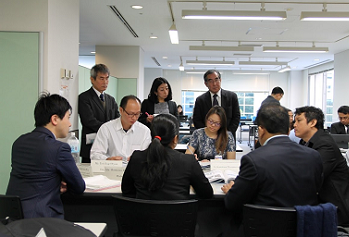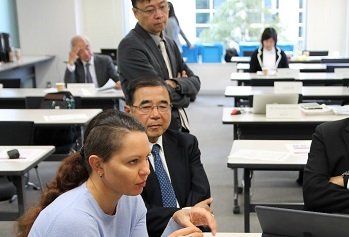Dr. Miyata joined the discussion of Group A – Singapore (Leader), Indonesia, Malaysia and Philippines. He gave further information of BEC settlement in Japan as follows.
It took about 5 years for Japan to settle BEC. To enforce BEC, the central government took the initiative and the local governments followed that policy. Coordinated actions of the central government covering the minimum requirements and the local governments promoting them have been helping building owners attain the high level of compliance to BEC.
Assignment of duties among the central governments is as follows: MLITT is responsible for the Building Construction Standards Act; METI and MLITT are for the Building Energy Conservation Act; and METI, MLITT and the Ministry of Environment jointly try to follow the roadmap for the realization of the low carbon society.
As for a local government, Tokyo Metropolitan Government has been dealing with BEC in a unique and advanced way by setting its own regulations with reference to the national codes. Because of their responsibility to conduct examination and inspection based on BEC, local governments frequently have exchanged their opinions with the central government.
One of the key indices for BEE is Primary Energy Consumption. In many ASEAN countries, however, electricity is the major source of energy, where indices other than Primary Energy Consumption may have been used. Therefore, the way of establishing and executing BEC can be different country by country. In addition, the whole building may not be regulated by BEC from the beginning, but the respective elements, such as building envelope performances, air conditioners efficiencies, etc. can possibly be regulated first.
Mr. Ushio joined the discussion of Group B – Thailand (leader), Cambodia, Lao PDR and Myanmar, where Thailand representative played the key role to make discussion productive, on one hand by giving advice to other countries based on their own experiences, and on the other hand by asking advices to professionals and experts present. Mr. Ushio from time to time gave pieces of advice for the difficult issues of establishing and executing BEC. His advisory comments during small group discussion was summarized as follows, which was also applicable to Group A except for the specific comments for Thailand.
Cambodia, Lao PDR, and Myanmar seem to have a long way to go, but BEC does not have to cover all the aspects (phases of from designing to operation, building facilities, envelopes, usage of buildings, etc.) from the beginning. It can be expanded in a stepwise manner from the minimum level to the comprehensive one. Besides, compliance with BEC can be started as voluntary and changed to mandatory later. In case of Japan, it took about 40 years to reach the present status.
Even after the establishment of BEC, its execution has other kinds of difficulties. In the case of JBEC, compliance with its design standards will become mandatory from April 2017. Then the local governments are supposed to face the problems of shortage of qualified personnel to inspect the design documents submitted by building owners. This problem can be solved by certifying third-party institutions which will be in charge of inspecting the documents and issuing certificates of compliance with BEC standards to building owners, which will then be reported to the local governments. On the other hand, METI is responsible for the energy efficiency in the operation phase of buildings, and asked ECCJ to analyze the reports submitted by building owners and to report on the results of analysis to METI.
Thailand already has BEC but its execution hasn’t become mandatory yet, not only because of the shortage of inspectors but also unfinished coordination among the related ministries and local governments. Once Japan had such problems, but now the responsibilities are clear – the designing and construction phase by MLITT, and the operation phase by METI. The new “EC Act for Buildings” will be enacted in April 2017, which covers the phases of designing and construction of building, separately from the Act on Rational Use of Energy. The way Japan handles the issue of BEC establishment and execution will be a good reference to Thailand.



